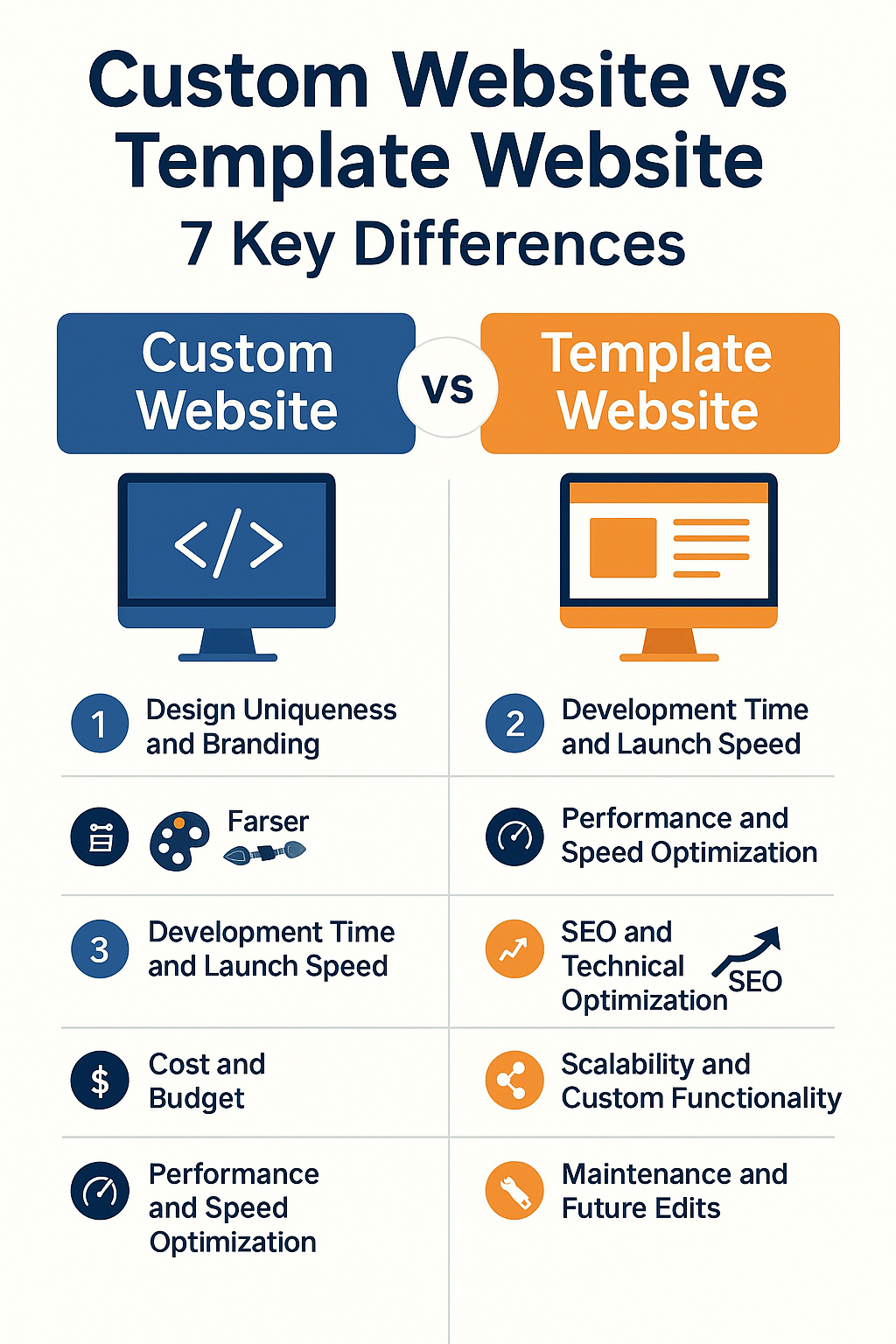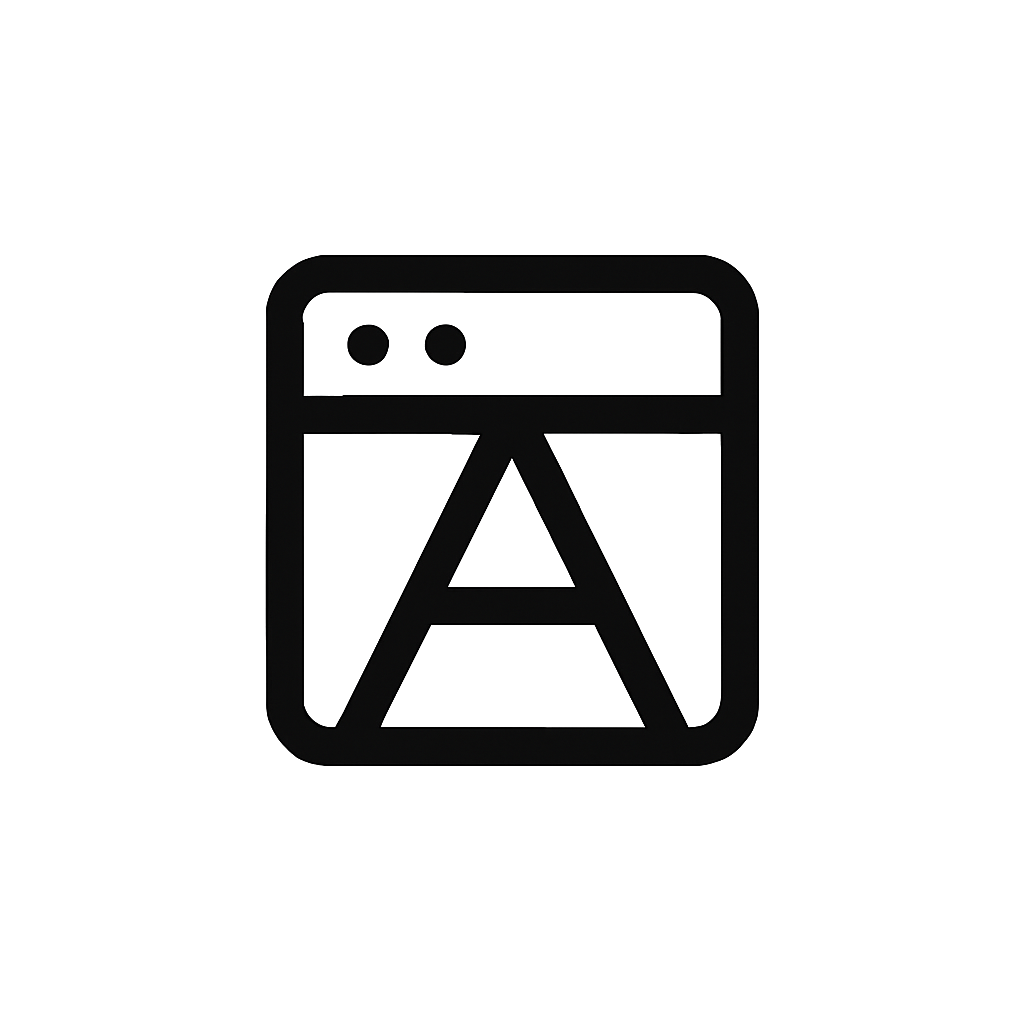
Introduction
Building a website for your small business? The choice between a custom website vs template website is a big one—and at Adwebify, we know it can feel overwhelming. Your site is your digital storefront, and picking the right approach impacts your budget, timeline, and growth. Should you go for a quick, budget-friendly template or invest in a fully tailored custom build? In 2025, with 75% of consumers judging businesses by their websites (WebFX), this decision is critical.
This guide breaks down 7 key differences in the custom website vs template website debate, tailored for small business owners. Drawing from our experience optimizing sites like those in Adwebify’s blog section, we’ll help you choose what fits your goals—without the fluff. Let’s dive in!
What Is a Template Website?
A template website uses pre-designed themes from platforms like WordPress, Wix, or Shopify. You customize colors, images, and content to fit your brand, but the core layout stays fixed.
Pros:
- Fast setup—days to weeks.
- Affordable, often $500-$2,000 with pro help.
- No coding needed with drag-and-drop tools.
Cons: Limited design flexibility; other businesses might use the same theme. Dollar Decoded sees templates as a great start for lean startups.
What Is a Custom Website?
A custom website is built from the ground up, with every pixel designed for your brand, goals, and audience. Developers code unique layouts and features to match your vision.
Pros:
- One-of-a-kind design.
- Scalable for complex needs (e.g., integrations).
- Optimized for speed and SEO.
Cons: Higher costs ($2,000-$10,000+) and longer timelines. Adwebify specializes in custom builds that grow with your business.
Custom Website vs Template Website: 7 Key Differences
1. Design Uniqueness and Branding
Template Website: Pick from a theme library—think Astra or Shopify’s Dawn. Your site risks looking like others using the same template, diluting your brand.
Custom Website: Every element—fonts, buttons, layouts—is crafted for you. A bakery’s site might feature warm, doughy visuals, while a tech firm gets sleek, futuristic vibes.
Takeaway: For standout branding, custom wins in the custom website vs template website debate—Adwebify tailors designs to make you unforgettable.
2. Development Time and Launch Speed
Template Website: Go live in 1-3 weeks with minimal tweaks or 5-10 days with pro setup (like Adwebify’s).
Custom Website: Expect 4-12 weeks for design, coding, and testing—longer for complex features.
Stat: 53% of users bounce if a site takes over 3 seconds to load (Google)—templates get you online faster to capture leads.
3. Cost and Budget
Template Website: Budget-friendly—$100-$500 for themes/plugins, $500-$2,000 with pro customization.
Custom Website: Starts at $2,000, climbing to $10,000+ for advanced features like eCommerce or CRMs.
Dollar Decoded Tip: Templates suit startups; custom fits established businesses planning growth—Adwebify offers both to match your budget.
4. Performance and Speed Optimization
Template Website: Many themes (e.g., free WordPress ones) are bloated with unused scripts, slowing load times. You’ll need tools like WP Rocket.
Custom Website: Built lean, with optimized code and images—think sub-2-second loads.
Why It Matters: A 1-second delay cuts conversions by 7% (Portent). Adwebify ensures speed in every build, custom or template.
5. SEO and Technical Optimization
Template Website: SEO varies by theme—some have messy code, poor headings, or weak mobile support, hurting rankings.
Custom Website: SEO is woven in—clean code, custom schema, optimized images, and mobile-first design.
Adwebify Edge: We bake Rank Math SEO into every site, leveling the custom website vs template website playing field.
6. Scalability and Custom Functionality
Template Website: Limited by theme/plugin compatibility. Adding a booking system or custom portal later can break things.
Custom Website: Designed to grow—integrate CRMs, APIs, or eCommerce with ease.
Example: A custom site for a gym could include a member portal; templates might struggle. Adwebify builds scalability into custom projects.
7. Maintenance and Future Edits
Template Website: Relies on third-party updates—outdated themes/plugins can crash your site.
Custom Website: Developers (like Adwebify) offer tailored support, making updates or redesigns smoother.
Pro Tip: Choose a provider with ongoing support—Adwebify’s plans include updates, hosting, and fixes for both options.
How to Choose in the Custom Website vs Template Website Debate
Your choice depends on your needs:
- Template Website: Ideal for quick launches, tight budgets, or simple sites (e.g., a coffee shop’s 5-page site).
- Custom Website: Best for unique branding, complex features, or long-term growth (e.g., a law firm with client portals).
Stat: 80% of small businesses prioritize cost over customization (Clutch)—but 60% regret not investing in scalability later. Adwebify’s hybrid approach (customized templates or full custom builds) bridges both worlds.
Memory Context: Your interest in optimizing Adwebify’s blog section suggests you value SEO and performance—our recommendations here align with those goals, ensuring either option maximizes visibility.
Final Thoughts
The custom website vs template website decision isn’t one-size-fits-all. Templates offer speed and savings, perfect for startups or simple needs. Custom sites deliver unique branding and scalability, ideal for growing businesses with big plans. In 2025, with online competition soaring, both can work if done right—Adwebify ensures your site shines either way.
Not sure which path fits? Contact Adwebify today. We’ll guide you through the custom website vs template website choice and build a site that’s fast, SEO-optimized, and ready to drive leads. Let’s make your small business stand out!
